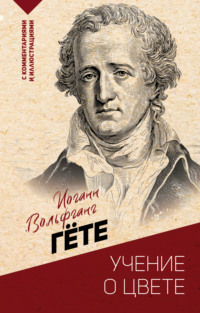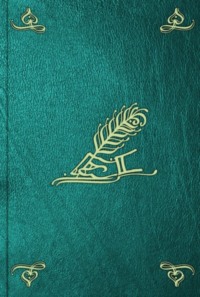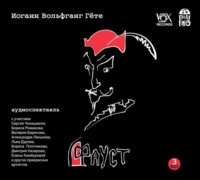 полная версия
полная версияLetters from Switzerland and Travels in Italy
And then the line of glittering glaciers was continually drawing the eye back again to the mountains. The sun made his way towards the west, and lighted up their great flat surfaces, which were turned towards us. How beautifully before them rose from above the snow the variegated rows of black rocks: – teeth, – towers, – walls! Wild, vast, inaccessible vestibules! and seeming to stand there in the free air in the first purity and freshness of their manifold variety! Man gives up at once all pretensions to the infinite, while he here feels that neither with thought nor vision is he equal to the finite!
Before us we saw a fruitful and populous plain. The spot on which we were standing was a high, bare mountain rock, which, however, produces a sort of grass as food for the cattle, which are here a great source of gain. This the conceited lord of creation may yet make his own: – but those rocks before his eyes are like a train of holy virgins which the spirit of heaven reserves for itself alone in these inaccessible regions. We tarried awhile, tempting each other in turn to try and discover cities, mountains, and regions, now with the naked eye, now with the telescope, and did not begin to descend till the setting sun gave permission to the mist, – his own parting breath, – to spread itself over the lake.
With sunset we reached the ruins of the fort of S. Cergue. Even when we got down in the valley, our eyes were still rivetted on the mountain glaciers. The furthest of these, lying on our left in Oberland, seemed almost to be melting into a light fiery vapour; those still nearer stood with their sides towards us, still glowing and red; but by degrees they became white, green, and grayish. There was something melancholy in the sight. Like a powerful body over which death is gradually passing from the extremities to the heart, so the whole range gradually paled away as far as Mont Blanc, whose ampler bosom was still covered all over with a deep red blush, and even appeared to us to retain a reddish tint to the very last, – just as when one is watching the death of a dear friend, life still seems to linger, and it is difficult to determine the very moment when the pulse ceases to beat.
This time also we were very loth to depart. We found our horses in S. Cergue; and that nothing might be wanting to our enjoyment, the moon rose and lighted us to Nyon. While on the way, our strained and excited feelings were gradually calmed, and assumed their wonted tone, so that we were able with keen gratification to enjoy, from our inn window, the glorious moonlight which was spread over the lake.
Geneva
At different spots of our travels so much was said of the remarkable character of the glaciers of Savoy, and when we reached Geneva we were told it was becoming more and more the fashion to visit them, that the Count1 was seized with a strange desire to bend our course in that direction, and from Geneva to cross Cluse and Salenche, and enter the valley of Chamouni, and after contemplating its wonderful objects, to go on by Valorsine and Trent into Valais. This route, however, which was the one usually pursued by travellers, was thought dangerous in this season of the year. A visit was therefore paid to M. de Saussure at his country-house, and his advice requested. He assured us that we need not hesitate to take that route; there was no snow as yet on the middle-sized mountains, and if on our road we were attentive to the signs of the weather and the advice of the country-people, who were seldom wrong in their judgment, we might enter upon this journey with perfect safety. Here is the copy of the journal of a day's hard travelling.
Cluse, in Savoy, Nov. 3, 1779.
To-day on departing from Geneva our party divided. The Count with me and a huntsman took the route to Savoy. Friend W. with the horses proceeded through the Pays de Vaud for Valais. In a light four-wheeled cabriolet we proceeded first of all to visit Hüber at his country-seat, – a man out of whom, mind, imagination and imitative tact, oozes at every pore, – one of the very few thorough men we have met with. He saw us well on our way, and then we set off with the lofty snow-capped mountains, which we wished to reach, before our eyes. From the Lake of Geneva the mountain-chains verge towards each other to the point where Bonneville lies, half way between the Mole, a considerable mountain, and the Arve. There we took our dinner. Behind the town the valley closes right in. Although not very broad, it has the Arve flowing gently through it, and is on the southern side well cultivated, and everywhere the soil is put to some profit. From the early morning we had been in fear of its raining some time at least before night, but the clouds gradually quitted the mountains, and dispersed into fleeces, – a sign which has more than once in our experience proved a favourable omen. The air was as warm as it usually is in the beginning of September, and the country we travelled through beautiful. Many of the trees being still green; most of them had assumed a brownish-yellow tint, but only a few were quite bare. The crops were rich and verdant; the mountains caught from the red sunset a rosy hue, blended with violet; and all these rich tints were combined with grand, beautiful, and agreeable forms of the landscape. We talked over much that was good. Towards 5 we came towards Cluse, where the valley closes, and has only one outlet, through which the Arve issues from the mountains, and by which also we propose to enter them to-morrow. We ascended a lofty eminence, and saw beneath us the city, partly built on the slightly inclined side of a rock, but partly on the flat portion of the valley. Our eyes ranged with pleasure over the valley, and sitting on the granite rocks we awaited the coming of night in calm and varied discourse. Towards seven, as we descended, it was not at all colder than it is usually in summer about nine. At a miserable inn (where, however, the people were ready and willing, and by their patois afforded us much amusement) we are now going, about ten o'clock, to bed, intending to set out early to-morrow, before the morning shall dawn.
Salenche, Nov. 4, 1779. Noon.
The cavern of the Col de Balme
Whilst a dinner is being prepared by very willing hands, I will attempt to set down the most remarkable incidents of our yesterday's journey, which commenced with the early morning. With break of day we set out on foot from Cluse, taking the road towards Balme. In the valley the air was agreeably fresh; the moon, in her last quarter, rose bright before the sun, and charmed us with the sight, as being one which we do not often see. Single light vapours rose upwards from all the chasms in the rocks. It seemed as if the morning air were awakening the young spirits, who took pleasure in meeting the sun with expanded bosoms and gilding them in his rays. The upper heaven was perfectly clear; except where now and then a single cloudy streak, which the rising sun lit up, swept lightly across it. Balme is a miserable village, not far from the spot where a rocky gorge runs off from the road. We asked the people to guide us through the cave for which the place is famous. At this they kept looking at one another, till at last one said to a second, "Take you the ladder, I will carry the rope, – come, gentlemen." This strange invitation did not deter us from following then. Our line of descent passed first of all among fallen masses of limestone rock, which by the course of time had been piled up step by step in front of the precipitous wall of rock, and were now overgrown with bushes of hazel and beech. Over these you reach at last the strata of the rock itself, which you have to climb up slowly and painfully by means of the ladder and of the steps cut into the rock, and by help of branches of the nut-trees, which hung over head, or of pieces of rope tied to them. After this you find yourself, to your great satisfaction, in a kind of portal, which has been worn out of the rock by the weather, and overlooks the valley and the village below. We now prepared for entering the cave; lighted our candles and loaded a pistol which we proposed to let off. The cave is a long gallery, mostly level and on one strand; in parts broad enough for two men to walk abreast, in others only passable by one; now high enough to walk upright, then obliging you to stoop, and sometimes even to crawl on hands and feet. Nearly about the middle a cleft runs upwards and forms a sort of a dome. In one corner another goes downwards. We threw several stones down it, and counted slowly from seventeen to nineteen before it reached the bottom, after touching the sides many times, but always with a different echo. On the walls a stalactite forms its various devices; however it is only damp in a very few places, and forms for the most part long drops, and not those rich and rare shapes which are so remarkable in Baumann's cave. We penetrated as far as we could for the water, and as we came out let off our pistol, which shook the cave with a strong but dull echo, so that it boomed round us like a bell. It took us a good quarter of an hour to get out again, and on descending the rocks, we found our carriage and drove onwards. At Staubbachs-Art we saw a beautiful waterfall; neither its height was very great nor its volume very large, and yet it was extremely interesting, for the rocks formed around it, as it were, a circular niche in which, its waters fell, and the pieces of the limestone as they were tumbled one over another formed the most rare and unusual groups.
We arrived here at mid-day, not quite hungry enough to relish our dinner, which consisted of warmed fish, cow beef, and very stale bread. From this place there is no road leading to the mountains that is passable for so stately an equipage as we have with us; it therefore returns to Geneva, and I now must take my leave of you, in order to pursue my route a little further. A mule with my luggage will follow us as we pick our way on foot.
Chamouni, Nov. 4, 1779
Evening, about 9 o'clock.
It is only because this letter will bring me for awhile nearer to yourself that I resume my pen; otherwise it would be better for me to give my mind a little rest.
The Valley of Chamouni-Mont Blanc
We left Salenche behind us in a lovely open valley; during our noonday's rest the sky had become overcast with white fleecy clouds, about which I have here a special remark to make. We had seen them on a bright day rise equally fine, I if not still finer, from the glaciers of Berne. Here too it again seemed to us as if the sun, had first of all attracted the light mists which evaporated from the tops of the glaciers, and then a gentle breeze had, as it were, combed the fine vapours, like a fleece of foam over the atmosphere. I never remember at home, even in the height of summer, (when such phenomena do also occur with us,) to have seen any so transparent, for here it was a perfect web of light. Before long the ice-covered mountains from which it rose lay before us; the valley began to close in; the Arve was gushing out of the rock; we now began to ascend a mountain, and went up higher and higher, with the snowy summits right before us. Mountains and old pine forests, either in the hollows below or on a level with our track, came out one by one before the eye as we proceeded. On our left were the mountain-peaks, bare and pointed. We felt that we were approaching a mightier and more massive chain of mountains. We passed over a dry and broad bed of stones and gravel, which the watercourses tear down from the sides of the rocks, and in turn flow among and fill up. This brought us into an agreeable valley, flat, and shut in by a circular ridge of rocks, in which lies the little village of Serves. There the road runs round some very highly variegated rocks, and takes again the direction towards the Arve. After crossing the latter you again ascend; the masses become constantly more imposing, nature seems to have begun here with a light hand, to prepare her enormous creations. The darkness grew deeper and deeper as we approached the valley of Chamouni, and when at last we entered it, nothing but the larger masses were discernible. The stars came out one by one, and we noticed above the peaks of the summits right before us, a light which we could not account for. Clear, but without brilliancy, like the milky way, but closer, something like that of the Pleiades; it rivetted our attention until at last, as our position changed, like a pyramid illuminated by a secret light within, which could best be compared to the gleam of a glow-worm, it towered high above the peaks of all the surrounding mountains, and at last convinced us that it must be the peak of Mont Blanc. The beauty of this view was extraordinary. For while, together with the stars which clustered round it, it glimmered, not indeed with the same twinkling light, but in a broader and more continuous mass, it seemed to belong to a higher sphere, and one had difficulty in thought to fix its roots again in the earth. Before it we saw a line of snowy summits, sparkling as they rested on the ridges covered with the black pines, while between the dark forests vast glaciers sloped down to the valley below.
My descriptions begin to be irregular and forced; in fact, one wants two persons here, one to see and the other to describe.
Here we are in the middle village of the valley called "Le Prieuré," comfortably lodged in a house, which a widow caused to be built here in honour of the many strangers who visited the neighbourhood. We are sitting close to the hearth, relishing our Muscatel wine from the Vallée d'Aost far better than the lenten dishes which were served up to our dinner.
Nov. 5, 1779. Evening.
To take up one's pen and write, almost requires as great an effort as to take a swim in the cold river. At this moment I have a great mind to put you off, by referring you to the description of the glaciers of Savoy, given by that enthusiastic climber Bourritt.
Invigorated however by a few glasses of excellent wine, and by the thought that these pages will reach you much sooner than either the travellers or Bourritt's book, I will do my best. The valley of Chamouni, in which we are at present, lies very high among the mountains, and, from six to seven leagues long, runs pretty nearly from south to north. The characteristic features which to my mind distinguish it from all others, are its having scarcely any flat portion, but the whole tract, like a trough, slopes from the Arve gradually up the sides of the mountain. Mont Blanc and the line of mountains which runs off from it, and the masses of ice which fill up the immense ravines, make up the eastern wall of the valley, on which, throughout its entire length, seven glaciers, of which one is considerably larger than the others, run down to the bottom of the valley.
The Ice-Lake
The guides whom we had engaged to show us to the ice-lake came to their time. One was a young active peasant, the other much older, who seemed to think himself a very shrewd personage, who had held intercourse with all learned foreigners, well acquainted with the nature of the ice-mountains, and a very clever fellow. He assured us that for eight and twenty years, – so long had he acted as guide over the mountains, – this was the first time that his services had been put in requisition so late in the year – after All Saints' Day, and yet that we might even now see every object quite as well as in June. Provided with wine and food we began to ascend Mont Anvert, from which we were told the view of the ice-lake would be quite ravishing. Properly I should call it the ice-valley or the ice-stream; for looking at it from above, the huge masses of ice force themselves out of a deep valley in tolerable smoothness. Right behind it ends a sharp-pointed mountain, from both sides of which waves of ice run frozen into the principal stream. Not the slightest trace of snow was as yet to be seen on the rugged surfaces, and the blue crevices glistened beautifully. The weather by degrees became overcast, and I saw grey wavy clouds, which seemed to threaten snow, more than it had ever yet done. On the spot where we were standing is a small cabin, built of stones, loosely piled together as a shelter for travellers, which in joke has been named "The Castle of Mont Anvert." An Englishman, of the name of Blaire, who is residing at Geneva, has caused a more spacious one to be built at a more convenient spot, and a little higher up, where, sitting by a fire-side, you catch through the window a view of the whole Ice-Valley. The peaks of the rocks over against you, as also in the valley below, are very pointed and rugged. These jags are called needles, and the Aiguille du Dru is a remarkable peak of this kind, right opposite to Mont Anvert. We now wished to walk upon the Ice Lake itself, and to consider these immense masses close at hand. Accordingly we climbed down the mountain, and took nearly a hundred steps round about on the wave-like crystal cliffs. It is certainly a singular sight, when standing on the ice itself, you see before you the masses pressing upwards, and divided by strangely shaped clefts. However, we did not like standing on this slippery surface, for we had neither come prepared with ice-shoes, nor with nails in our usual ones; on the contrary, those which we ordinarily wore had become smooth and rounded with our long walk; we, therefore, made our way back to the hut, and after a short rest were ready for returning. We descended the mountain, and came to the spot where the ice-stream, step by step, forces its way to the valley below, and we entered the cavern, into which it empties its water. It is broad, deep, and of the most beautiful blue, and in the cave the supply of water is more invariable than further on at the mouth, since great pieces of ice are constantly melting and dissolving in it.
On our road to the Auberge we passed the house where there were two Albinos, – children between twelve and fourteen, with very white complexions, rough white hair, and with red and restless eyes like rabbits. The deep night which hangs over the valley invites me to retire early to bed, and I am hardly awake enough to tell you, that we have seen a tame young ibex, who stands out as distinctly among the goats as the natural son of a noble prince from the burgher's family, among whom he is privately brought up and educated. It does not suit with our discourses, that I should speak of anything out of its due order. Besides, you do not take much delight in specimens of granite, quartz, or in larch and pine trees, yet, most of all, you would desire to see some remarkable fruits of our botanising. I think I am stupid with sleep, – I cannot write another line.
Chamouni, Nov. 6, 1776. Early.
Content with seeing all that the early season allows us to see, we are ready to start again, intending to penetrate as far as Valais to-day. A thick mist covers the whole valley, and reaches half way up the mountains, and we must wait and see what sun and wind will yet do for us. Our guide purposes that we should take the road over the Col-de-Balme, a lofty eminence, which lies on the north side of the valley towards Valais, from the summit of which, if we are lucky, we shall be able to take another survey of the valley of Chamouni, and of all its remarkable objects.
Whilst I am writing a remarkable phenomenon is passing along the sky. The mists which are shifting about, and breaking in some places, allow you through their openings as through skylights, to catch a glance of the blue sky, while at the same time the mountain peaks, which rising above our roof of vapour, are illuminated by the sun's rays. Even without the hope it gives of a beautiful day, this sight of itself is a rich treat to the eye.
We have at last obtained a standard for judging the heights of the mountains. It is at a considerable height above the valley, that the vapour rests on the mountains. At a still greater height are clouds, which have floated off upwards from the top of the mist, and then far above these clouds you see the summits glittering in the sunshine.
It is time to go. I must bid farewell to this beautiful valley and to you.
Martinac, in Valais,
Nov. 6, 1779. Evening.
We have made the passage across without any mishap, and so this adventure is over. The joy of our good luck will keep my pen going merrily for a good half hour yet.
Having packed our luggage on a mule, we set out early (about 9,) from Prieuré. The clouds shifted, so that the peaks were now visible and then were lost again; at one moment the sun's rays came in streaks on the valley, at the next the whole of it was again in shade. We went up the valley, passing the outlet of the ice-stream, then the glacier d'Argentière, which is the highest of the five, the top of it however was hidden from our view by the clouds. On the plain we held a counsel, whether we should or not take the route over Col de Balme, and abandon the road over Valorsine. The prospect was not the most promising; however, as here there was nothing to lose and much perhaps to gain, we took our way boldly towards the dark region of mists and clouds. As we approached the Glacier du Tour, the clouds parted, and we saw this glacier also in full light. We sat down awhile and drank a flask of wine, and took something to eat. We now mounted towards the sources of the Arve, passing over rugged meadows and patches scantily covered with turf, and came nearer and nearer to the region of mists, until at last we entered right into it. We went on patiently for awhile till at last as we got up higher, it began again to clear above our heads. It lasted for a short time, so we passed right out of the clouds, and saw the whole mass of them beneath us spread over the valley, and were able to see the summits of all the mountains on the right and left that enclosed it, with the exception of Mont Blanc, which was covered with clouds. We were able to point them out one by one, and to name them. In some we saw the glaciers reaching from their summits to their feet, in others we could only discern their tracks, as the ice was concealed from our view by the rocky sides of the gorges. Beyond the whole of the flat surface of the clouds, except at its southern extremity, we could distinctly see the mountains glittering in the sunshine. Why should I enumerate to you the names of summits, peaks, needles, icy and snowy masses, when their mere designations can furnish no idea to your mind, either of the whole scene or of its single objects?
Col de Balme
It was quite singular how the spirits of the air seemed to be waging war beneath us. Scarcely had we stood a few minutes enjoying the grand view, when a hostile ferment seemed to arise within the mist, and it suddenly rose upwards and threatened once more to envelope us. We commenced stoutly ascending the height, in the hope of yet awhile escaping from it, but it outstripped us and enclosed us on all sides. However, perfectly fresh, we continued to mount, and soon there came to our aid a strong wind, blowing from the mountain. Blowing over the saddle which connected two peaks, it drove the mist back again into the valley. This strange conflict was frequently repeated, and at last, to our joy, we reached the Col de Balme. The view from it was singular, indeed unique. The sky above the peaks was overcast with clouds; below, through the many openings in the mist, we saw the whole of Chamouni, and between these two layers of cloud the mountain summits were all visible. On the east we were shut in by rugged mountains, on the west we looked down on wild valleys, where, however, on every green patch human dwellings were visible. Before us lay the valley of Valais, where at one glance the eye took in mountains piled in every variety of mass one upon another, and stretching as far as Martinac and even beyond it. Surrounded on all sides by mountains which, further on towards the horizon, seemed continually to multiply and to tower higher and higher, we stood on the confines of Valais and Savoy.
Some contrabandists, who were ascending the mountains with their mules, were alarmed at seeing us, for at this season they did not reckon on meeting with any one at this spot. They fired a shot to intimate that they were armed, and one advanced before the rest to reconnoitre. Having recognised our guide and seen what a harmless figure we made, he returned to his party, who now approached us, and we passed one another with mutual greetings.









